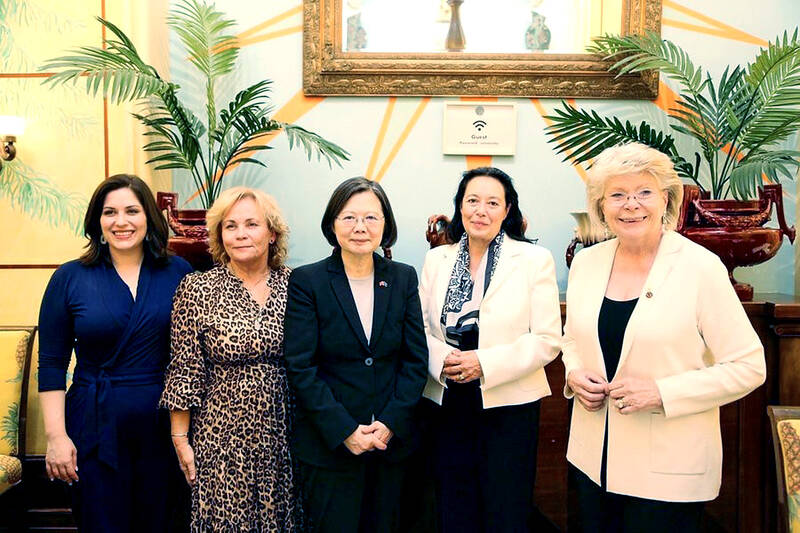Taiwan always stands with Europe in facing global challenges as partners sharing the values of democracy, freedom and human rights, former president Tsai Ing-wen (蔡英文) said in Brussels yesterday as she wrapped up her visit in Europe.
In a post on Facebook, Tsai said she deeply felt Europe’s support for Taiwan after meeting with more than 80 members of the European Parliament, Belgian Federal Parliament and Dutch Parliament, adding that she had expressed to them the gratitude of Taiwanese.
“Taiwan and Europe enjoy the values of democracy, freedom and human rights, and we are also good partners in facing global challenges together,” she wrote in a post that included a video with short clips of her visit in Brussels, the last stop of her European trip.

Photo: Screen grab from Tsai Ing-wen’s X account
“From facing the global [COVID-19] pandemic to the expansion of authoritarian rule, Taiwan and Europe always stand together,” she said. “Taiwan also proves that a society rooted in freedom, democracy and respect for human dignity can still flourish, even in the face of enormous challenges and coercion from authoritarianism.”
While more obstacles lie ahead, seeing so many European friends show solidarity and support for Taiwan gives the nation more confidence and courage to face the world’s next challenges, Tsai said.
“I thank all our friends in Europe for their support for people in Taiwan, which allows Taiwanese to not only hold their heads up and stride forward in Europe, but also dedicate themselves on the world stage,” she said.

Photo courtesy of the Ministry of Foreign Affairs
In a separate post, Tsai wrote that Taiwan is an important and reliable partner in global supply chains and enhancing international economic security.
“I hope our friends in Europe will continue to support Taiwan’s meaningful participation in international organizations,” she added. “When China attempts to change the status quo of the Taiwan Strait through maritime action and intruding into our airspace, I also hope the global democratic society can come together to deter this type of activity that endangers regional peace and stability.”
Tsai set off for Europe on Sunday last week, her first trip abroad since leaving office as president in May. She is scheduled to return to Taiwan today.
Separately, an unveiling ceremony of the Advanced Chip Design and Research Center was held in Brno, Czech Republic, on Friday.
The center is a collaboration between the National Applied Research Laboratories and the Czech Republic’s CyberSecurityHubCZ, a cybersecurity organization founded by Masaryk University, Brno University of Technology and Czech Technical University in 2020.
In a prerecorded video played at the ceremony, Minister of Foreign Affairs Lin Chia-lung (林佳龍) expressed gratitude for the Czech government’s full support to Taiwan-Czech cooperation, as well as for Czech friends’ hospitality and careful arrangements during Tsai’s visit to the country a few days earlier.
Lin also said that Taiwan, the Czech Republic and other democratic countries should work together to strengthen economic security and democratic resilience in response to global challenges from geopolitical changes, environmental issues, and shifts in economic security and industrial development.

‘WIN-WIN’: The Philippines, and central and eastern European countries are important potential drone cooperation partners, Minister of Foreign Affairs Lin Chia-lung said Minister of Foreign Affairs Lin Chia-lung (林佳龍) in an interview published yesterday confirmed that there are joint ventures between Taiwan and Poland in the drone industry. Lin made the remark in an exclusive interview with the Chinese-language Liberty Times (the Taipei Times’ sister paper). The government-backed Taiwan Excellence Drone International Business Opportunities Alliance and the Polish Chamber of Unmanned Systems on Wednesday last week signed a memorandum of understanding in Poland to develop a “non-China” supply chain for drones and work together on key technologies. Asked if Taiwan prioritized Poland among central and eastern European countries in drone collaboration, Lin

The US government has signed defense cooperation agreements with Japan and the Philippines to boost the deterrence capabilities of countries in the first island chain, a report by the National Security Bureau (NSB) showed. The main countries on the first island chain include the two nations and Taiwan. The bureau is to present the report at a meeting of the legislature’s Foreign Affairs and National Defense Committee tomorrow. The US military has deployed Typhon missile systems to Japan’s Yamaguchi Prefecture and Zambales province in the Philippines during their joint military exercises. It has also installed NMESIS anti-ship systems in Japan’s Okinawa

The Chien Feng IV (勁蜂, Mighty Hornet) loitering munition is on track to enter flight tests next month in connection with potential adoption by Taiwanese and US armed forces, a government source said yesterday. The kamikaze drone, which boasts a range of 1,000km, debuted at the Taipei Aerospace and Defense Technology Exhibition in September, the official said on condition of anonymity. The Chungshan Institute of Science and Technology and US-based Kratos Defense jointly developed the platform by leveraging the engine and airframe of the latter’s MQM-178 Firejet target drone, they said. The uncrewed aerial vehicle is designed to utilize an artificial intelligence computer

Renewed border fighting between Thailand and Cambodia showed no signs of abating yesterday, leaving hundreds of thousands of displaced people in both countries living in strained conditions as more flooded into temporary shelters. Reporters on the Thai side of the border heard sounds of outgoing, indirect fire yesterday. About 400,000 people have been evacuated from affected areas in Thailand and about 700 schools closed while fighting was ongoing in four border provinces, said Thai Rear Admiral Surasant Kongsiri, a spokesman for the military. Cambodia evacuated more than 127,000 villagers and closed hundreds of schools, the Thai Ministry of Defense said. Thailand’s military announced that